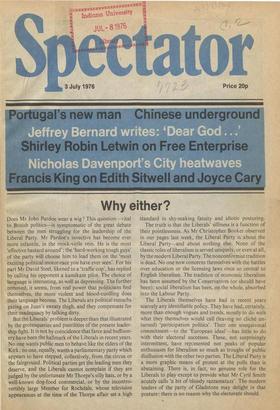Why either?
Does Mr John Pardoe wear a wig? This question—vital to British politics—is symptomatic of the great debate between the men struggling for the leadership of the Liberal Party. Mr Pardoe's invective has become ever more infantile, in the mock-virile vein. He is the most 'effective bastard around' ; the 'hard-working tough guys' of the party will choose him to lead them on the 'most -exciting political motor-race you have ever seen'. For his part Mr David Steel, likened to a 'traffic cop', has replied by calling his opponent a kamikaze pilot. The choice of language is interesting, as well as depressing. The. further removed, it seems, from real power that politicians find themselves, the more violent and blood-curdling does their language become. The Liberals are political eunuchs gazing on Juan's sweaty thigh, and they compensate for their inadequacy by talking dirty.
But the Liberals' problem is deeper than that illustrated by the grotesqueries and puerilities of the present leadership fight. It is not by coincidence that farce and buffoonery have been the hallmark of the Liberals in recent years. No one wants public men to behave like the elders of the Kirk ; no one, equally, wants a parliamentary party which appears to have stepped, collectively, from the circus or ' the fairground. Political parties get the leading men they deserve, and the Liberals cannot complain if they are judged by the unfortunate Mr Thorpe's silly hats, or by a well-known dog-food commercial, or by the incontrovertibly large Member for Rochdale, whose television appearances at the time of the Thorpe affair set a high standard in shy-making fatuity and idiotic posturing.
The truth is that the Liberals' silliness is a function of their pointlessn6s. As Mr Christopher Booker observed in our pages last week, the Liberal Party is about the Liberal Party—and about nothing else. None of the classic roles of liberalism is served uniquely, or even at all, by the modern Liberal Party. The nonconformist tradition is dead. No one now concerns themselves with the battles over education or the licensing laws once so central to English liberalism. The tradition of economic liberalism has been assumed by the Conservatives (or should have been); social liberalism has been, on the whole, absorbed into the Labour Party.
The Liberals themselves have had in recent years scarcely any identifiable poficy. They have had, certainly, more than enough vogues and trends, mostly to do with what they themselves would call (leaving no cliché unturned) 'participation politics'. Their one unequivocal commitment—to the 'European ideal'—has little to do with their electoral successes. These, not surprisingly intermittent, have repi-esented not peaks of popular enthusiasm for liberalism so much as troughs of public disillusion with the other two parties. The Liberal Party is a more graphic means of protest at the polls than is abstaining. There is, in fact, no genuine role for the Liberals to play except to provide what Mr Cyril Smith acutely calls 'a bit of bloody razzamatazz'. The modern leaders of the party of Gladstone may delight in that posture: there is no reason why the electorate should.


































